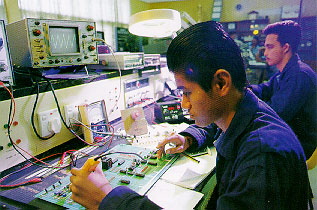PKNP - Lifeline to The 21st Century
IN RETROSPECT
Pahang's industrial history goes back as far as twenty years ago, when the Bumiputra Economic Congress was held in Malice in 1965. As a result, the Perbadanan Kemajuan Negeri Pahang ( PKNP ) or Pahang State Development Corporation was born, commencing its functions and duties under the vested interests of the Enakmen Lembaga Kemajuan Negeri Pahang ( Pahang State Development Enactment ). It began operations two years later, concentrating on important objectives to increase, encourage and render services, which, in turn, would accelerate the development of Pahang's rural socio-economy.
OBJECTIVES & FUNCTIONS -
PAST AND PRESENT

Among the more crucial objectives was the improvement of the State's infrastructure in the quest to heighten Pahang's stature as an industrial success story. Another aspect was the tourism sector, which the State Government recognised as a billion dollar industry. As such, PKNP was given the important task of supporting, co-ordinating and vitalising the tourism infrastructure.
- Pahang's aspiration to become an economic top gun did
not cease here. Measures were also taken to enhance and promote other related
activities. In 1988, bold steps were taken to form two subsidiaries ; Pasdec
Corporation Sdn.Bhd. ( currently known as Pasdec Holdings Bhd. ) and Pascorp
Holdings Sdn.Bhd. ( now known as Pasdec Resources ). Each possessed different
strategies, but shared identical goals - to raise the living standards
and heighten economic progress for Pahang's populace.
In an effort to reach out to investors speedily, trade and investment missions have been conducted in East Asian and European countries. Some of the countries visited were Taiwan, Hong Kong, South Korea, Germany, United Kingdom and Finland. This has led to land developments, land sales and job creations in Pahang. By the end of 1996, more than 1,808 hectares of land had been developed and almost 37,000 jobs had been created. For example, Amoco Chemical (M) Sdn.Bhd. invested RM. 1.2billion in a chemical plant on a six hectare site. Already boasting of 380 locals under its wing, it now plans to spend RM 40 million for training and skill development, mostly for its local employees.

- To ensure an educated and skillful pool of manpower -
one of the more important aspects attracting foreign investors to Pahang
State is the setting up of the Pahang Skills Development Centre (PSDC)
which provides pre-employment training, re-training, manpower information
and technology awareness. Training programmes range from technical to managerial
levels, keeping in line with its aim to fully tap all inherent potential
in each worker.
The main reason for transforming itself into a One Stop Agency (OSA) was to attract foreign and local investors to look at Pahang as an ideal location for all their business needs. PKNP then created strategies to transform Pahang into a vibrant and dynamic investment center. From hereon, its responsibilities fell into four crucial areas; namely as promoter of investments, facilitator for investors' applications, co-ordinator of construction works and advisor to investors.
For instance, it manages all applications, co-ordinating with various State and Federal Authorities to obtain the relevant approvals for investors. It also receives the application of land/factory sites, whereby it analyses the suitability and relevant infrastructure requirements.
ACHIEVEMENTS
With over twenty years of experience and commitment to its field of service. PKNP has done its fair share and more to ensure the betterment of Pahang. This was evident when it successfully launched more than 10,000 units of residential and shop houses in areas such as Sg. Marong, Cameron Highlands, Jerantut, Kuantan, Temerloh, Mentakab, Pekan, Maran, Kuala Pahang and Sri Rompin - all of which totalled some RM54.9 million by the end of the Fifth Malaysian Plan. Out of 10,843 units of housing and shop houses, 4,644 were low cost government houses and 1,018 low cost PKNP houses. Shop houses numbered 657 units. In addition, PKNP controls and maintains the pricing of these properties as a safeguard against speculators.
- Another gratifying achievement for the Corporation is
that it successfully increased Bumputra participation in business. Employing
a pragmatic approach, the state body has (and still is) effectively conducted
training schemes, workshops, seminars, motivational courses as well as
provided professional guidance to develop and upgrade Bumputra entrepreneurs.
To date, PKNP has trained more than a 3,000 Bumiputras.
PKNP's subsidiaries have shone in similar capacities, helping to implement PKNP's socio-economic programmes effectively. For instance, Pasdec Holdings Bhd. concentrated its efforts in the areas of property, tourism and industrial sectors. Read this as numerous building projects, landed property, mining and trading. One of the earliest and more notable projects is the development of Bandar Indera Mahkota, twin city to Kuantan. The new township was established as the gateway to the East Coast. From the very beginning, every effort was made to make Indera Mahkota a fully integrated town, fitted out with wholesome infrastructure facilities, residential areas, shoplots, industrial estates, educational institutions, recreational centres and public amenities. Apart from this Pasdec Holdings also seeks opportunities in manufacturing, agriculture, tourism and the hotel industry.
PKNP is serious in turning the Peninsula's largest state
into the country's biggest tourism draw. The State's long term plan, is
showing good results, as it has recorded ever increasing returns over the
years. Approximately, RM1.52 billion has been earned from tourism spending
until 1996. Second subsidiary, Pasdec Resources Sdn. Bhd. is also actively
involved in the tourism industry as well as the manufacturing industry.
Pasdec Resources concentrates on encouraging joint venture projects to
spur manufacturing activities in Pahang. For instance, it recently went
into a joint venture with Sitt Tatt (M) Sdn. Bhd. to provide supply industrial
gases to the State.
INTO THE FUTURE
PKNP will continue to plan and implement development programmes for the benefit of Pahang. An underwater cable system in Cherating is being built by Telekom Malaysia. Once operational, links between Telekom Malaysia, Asia Pacific Cable Network and the Earth Satellite Station in Beserah. This, in turn, will launch the State out into areas of information technology, financial and health services.
The incentive to create greater employment opportunities remains PKNP's main agenda. Now is also the time to contemplate other issues such as correcting the Forex imbalances via import substitution, progress towards a more export oriented environment, increase value-added quality to local products and to adopt a multiplier effect on local economy.